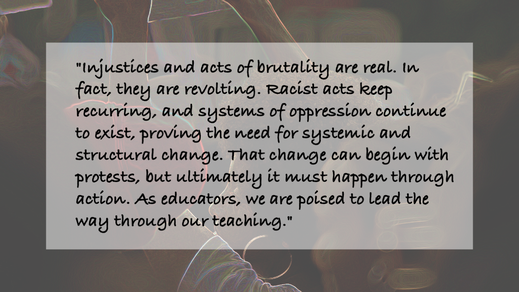BY XENIA HADJIOANNOU & LAUREN AIMONETTE LIANG When the Novel Coronavirus upended our personal and professional lives way back in March, CLA created this biweekly blog “to help and support our members and the greater education community who are using children’s literature in their newly online or remote settings” (3/21/2020 Blogpost by Lauren Liang). Since then, we have been grateful for the generous willingness of CLA leaders and members to contribute timely and informative posts on various topics, ranging from annotated listings of online resources for children’s literature and related content, to curated book-lists, to recommendations for a wide array of literature response engagements. We have also been humbled by the positive responses to the CLA Blog and by its growing readership. Following the school-year cycle, the CLA blog will be going on hiatus for the summer break and will resume operations in early August as a weekly blog. We anticipate that the coming academic year will bear enduring challenges as a result of the continuing uncertainties and concerns precipitated by the COVID-19 pandemic. We aim to be a helpful resource in responding to these shifting educational contexts. We also hope that the coming academic year will be a pivotal time for honest, critical conversations about racism and the injustices it births and sustains, and for engagements valorizing the lived experience of minoritized communities. As our nation and the world mourns for the death of George Floyd, we stand in solidarity with efforts to expose and counter racism and systems of oppression, and aspire to meaningfully contribute to them. We remain in awe of the dedication, instructional agility, and deep professional knowledge of our teachers and librarians. We look forward to joining together with you in August back in this space. Contributing to the Blog
CLA Members: Interested in writing a post for the CLA blog? Please email Lauren Aimonette Liang. We welcome posts written this summer for fall publication, and are especially interested in posts from CLA members teaching in K-12 classrooms.
In response to the recent events surrounding the death of George Floyd, NCTE's Presidential Team has released a letter taking a stance against racism. Below we, the Children's Literature Assembly of NCTE, provide this important letter in its entirety.
This statement was written by the leaders of the NCTE Presidential Team. The National Council of Teachers of English (NCTE) denounces all forms of racial violence and brutality. We grieve with the family and friends of George Floyd and with all who are suffering during these devastating times. As we seek justice, we stand in solidarity with demonstrations and protests that raise awareness of, and that call for action against, systemic racism in this country. Because we treasure our First Amendment rights, we also denounce the arrest and mistreatment of journalists, especially journalists of Color, who work tirelessly to keep the world informed about what is happening in our various communities. Injustices and acts of brutality are real. In fact, they are revolting. Racist acts keep recurring, and systems of oppression continue to exist, proving the need for systemic and structural change. That change can begin with protests, but ultimately it must happen through action. As educators, we are poised to lead the way through our teaching. NCTE’s vision and long-held commitment is “to apply the power of language and literacy to actively pursue justice and equity for all students and the educators who serve them.” As literacy educators, we are concerned for our students and their families. We pledge to continue our efforts to create equity inside classrooms. We celebrate theGary B., et al. v. Whitmer, et al. settlement: students in Detroit and elsewhere “have a fundamental right to education.” And we applaud the New Mexico Yazzie/Martinez decision “to provide all students with a uniform and sufficient education . . . .” Equity in classrooms for teachers of English and our students is paramount. It is through education that we believe we can make a lasting difference. This includes educating about the right to vote. As Atlanta Mayor Keisha Lance Bottoms has advised, “ . . . if you want change in America, go and register to vote. Show up at the polls.” 
We cannot stop there. As literacy educators, our aim is to help students and communities to imagine a better, more humane world and to take the steps to achieve it. As advocated by NCTE’s Statement on Anti-Racism to Support Teaching and Learning, we must be active, both collectively and individually, in “counteracting racism and other forms of bigotry in teaching materials, methods, and programs for the teaching and learning of English and the language arts.”
As the nation’s oldest organization of preK through graduate school literacy educators, NCTE has a rich history of deriving expertise and advocacy from its members’ professional research, practice, and knowledge. We are stronger by looking to one another for wisdom. Some of our NCTE members have already begun to speak on recent events, such as the Early Childhood Education Assembly, which recently released its powerful Call to Action Countering Anti-Blackness in Society & Schools. We are grateful for this work, and we know that other NCTE members are also finding ways to address these issues and to provide resources. NCTE’s publications serve as important resources that can guide our thoughts and actions during this time, and we recommend them to you. The following materials may also be helpful:
Also, we remind members that NCTE continues to offer opportunities such as the online Member Gatherings and author-led talks as ways to ensure that we support, encourage, and uplift each other. Know that we are committed to motivating action, working for educational equity, and standing in solidarity, together. Leah Zuidema, President Alfredo Celedón Luján, President-Elect Valerie Kinloch, Vice President Franki Sibberson, Past President Emily Kirkpatrick, Executive Director Editors' Note
Many organizations, newspapers, book creators, literacy scholars, teachers and bookstores have created compelling antiracist booklists for different age groups, which are widely available on social media and on websites and blogs. We encourage our members and other readers to explore and use these lists with the children in their lives.
Image by Orna Wachman from Pixabay
BY GRACE ENRIQUEZ & DENISE DÁVILA
In the emergency shift to remote learning, educators and parents sought and found a plethora of video read-alouds and digital libraries of children’s books. This heartened us, as these resources offered access to reading material that many children wouldn’t be able to obtain otherwise.
Now that the school year is winding down, and the initial rush to cobble together online books has abated, we take a moment to reflect on the range of online books and resources available for children. Specifically, as educators committed to social justice, we wondered where we could turn to (a) continue sharing children’s literature with our students to support our goals of diversity, inclusion, and equity, and (b) learn more about recently published youth literature created by and for members of minoritized groups. It wasn’t surprising that what is currently available online reflects the massive gap in books about, for, and by diverse communities and underscores the greater need for more diverse books for children overall. In an attempt to close that gap and promote understanding about why diverse books matter--especially now during this global pandemic and in light of the systemic racism, police brutality, and health disparities that our country is currently facing--we have curated a list of online professional guides, blogs, conversations, and other resources. WEBSITES, BLOGS, & PODCASTS - IN ALPHABETICAL ORDER
Grace Enriquez is a Professor of Language and Literacy at Lesley University and a past recipient of the CLA Research Award.
Denise Dávila is an Assistant Professor of Language and Literacy Studies at the University of Texas, Austin and a CLA member.
Image by Gerd Altmann from Pixabay
|
Authors:
|
CLA
About CLA
|
Journal of Children's Literature
Write for JCL
|
ResourcesCLA-sponsored NCTE Position Statements
|
Members-Only Content
CLA Video Library
|
© COPYRIGHT 2018.
ALL RIGHTS RESERVED |

 RSS Feed
RSS Feed